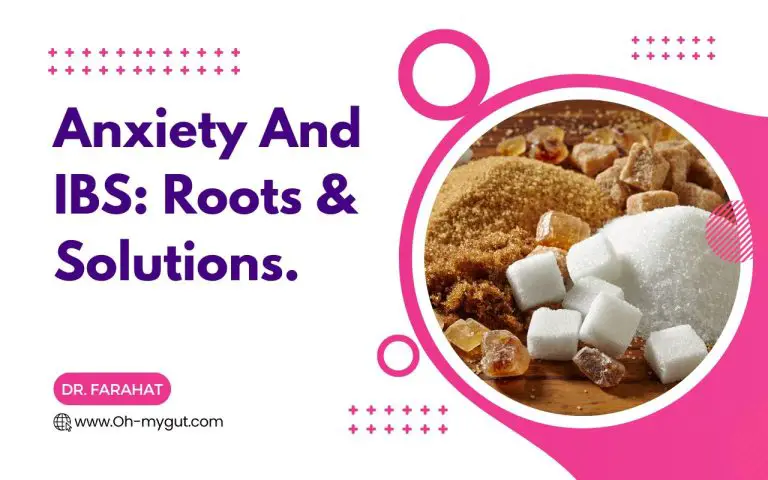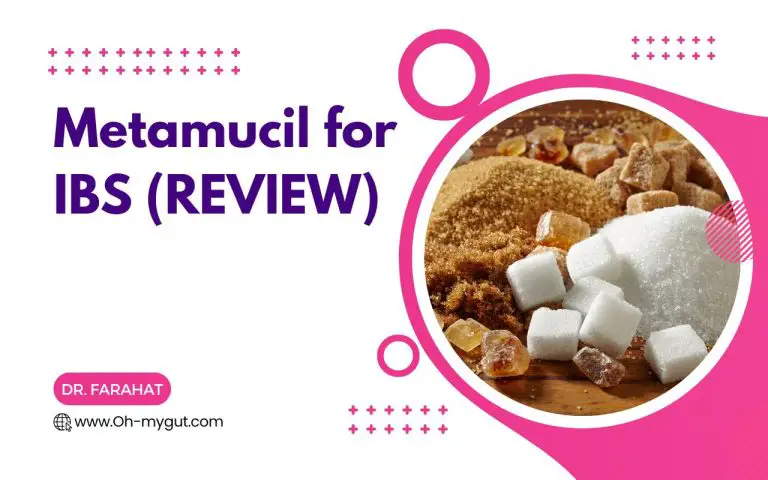Metamucil (psyllium) For IBS: In-depth Review (By GI Doctor).
Our content is not intended nor recommended as a substitute for medical advice by your doctor. Use for informational purposes only.
Wondering if Metamucil can be your knight in shining armor against IBS symptoms?
Pondering if it holds equal power across all IBS battlegrounds – constipation, diarrhea, and the mixed terrain?
If Metamucil is on your radar for combating IBS, we’ve got the ultimate A-Z guide ready for you. It’ll tackle all your queries about this supplement’s potency, safety measures, usage, and potential side effects.
Oh-mygut.com was born out of my dual identity – a gastroenterology doctor and an IBS warrior. I aim to be your ally, offering evidence-based answers to your pressing IBS questions. Stay connected as we march on this journey together.
Here is a quick overview of Psyllium (Metamucil) for IBS:
| Topic | Information about Metamucil |
|---|---|
| What is Psyllium? | Psyllium is a type of soluble fiber derived from the seeds of the Plantago ovata plant. It’s commonly used as a dietary supplement for its beneficial effects on digestive health. |
| Brands | Metamucil is one of the most recognized brands that use Psyllium as a primary ingredient. Other brands include Citrucel and Benefiber. |
| Use in IBS | Psyllium can be beneficial for managing both constipation and diarrhea symptoms associated with Irritable Bowel Syndrome (IBS). It works by absorbing water in the intestines, adding bulk to the stool, and helping maintain regular bowel movements. |
| Dosage | The typical dosage ranges from 1 teaspoon of powder or one capsule once daily, up to 2 teaspoons (or 1 capsule) three times daily. It’s always advisable to start low and slow to monitor your body’s reaction and avoid adverse effects like gas and bloating. |
| Administration | Psyllium can be taken at any time of the day, preferably with plenty of water (8 Fl. Oz or 250 CC). It can be consumed before, after, or between meals. |
| Side Effects | Common side effects include gas, bloating, and minor abdominal discomfort. Allergic reactions, difficulty swallowing, and worsening IBS symptoms are less common but possible. If side effects persist, it’s advisable to consult with your healthcare provider. |
| Safety during Pregnancy and Lactation | No definitive studies have been done to establish the safety of psyllium during pregnancy or lactation. However, since psyllium is not absorbed into the bloodstream, it’s considered theoretically safe. Consult your doctor before use. |
| Purchase and Pricing | Psyllium-based products like Metamucil can be purchased at local stores, pharmacies, or online retailers like Amazon. Prices may vary. |
| Special Considerations | Psyllium is generally low in FODMAPs and therefore can be suitable for those following a low-FODMAP diet. Also, taking psyllium with other medications should be done cautiously as it can affect the absorption of some drugs. |
| Effectiveness | Psyllium typically begins to work within 12 to 72 hours, though individual responses may vary. It’s important to remember to drink plenty of water when taking psyllium to enhance its effectiveness. |
1- The scientific evidence for the use of Metamucil (psyllium) for IBS.
Metamucil, or scientifically known as psyllium, is a fiber variant that’s geared to ease your IBS symptoms. Now, fibers can be split into two primary categories:
Insoluble Fiber: This variety doesn’t dissolve in water and escapes digestion by your intestinal enzymes. It lends volume to the stool. However, it might aggravate your IBS if consumed in large quantities.
Soluble Fiber: This fiber type dissolves in water to form a gel-like substance and is fermented by gut bacteria. Depending on the degree of ‘fermentability’, soluble fiber can be further broken down into:
- Highly Fermentable: Primarily short-chain fatty acids (FODMAPs) – these are IBS villains. They generate more gas, worsening your IBS.
- Moderately Fermentable: These don’t cause a gas uproar, letting you enjoy the fiber perks minus the side effects. Psyllium (Metamucil) is a perfect example of this.
The contribution of fiber in managing irritable bowel syndrome still sparks debates. A 2012 meta-analysis drew a blank on benefits from both soluble and insoluble fibers in IBS.
Conversely, another meta-analysis pointed towards a slight amelioration in IBS symptoms with the soluble fiber psyllium (Metamucil) compared to a placebo (a sham treatment used in research to gauge the effectiveness of the actual treatment).
Other fiber types, like Bran, failed to outdo placebos in improving IBS. This leaves us with Metamucil as the top fiber contender for IBS relief, albeit the evidence isn’t rock-solid.
Tagged as ‘Soluble’ and ‘Moderately Fermentable’, Metamucil dissolves in water within your small intestine and colon, triggering beneficial impacts on your IBS, particularly with constipation.
This video from the Metamucil YouTube channel explains exactly how Metamucil works.
Metamucil for IBS works in different ways to benefit your IBS: (reference)
- Metamucil Retains water inside your intestine → it swells and makes gelatinous mass → thus makes your stool softer and this helps your IBS, especially IBS with constipation [Laxative effect]
- Also, this “Mass forming” advantage of Metamucil will increase the bulk of your stool → stimulates peristaltic movement of your colon → helps with easier passage of stool (especially with constipation). (reference)
- Another believed benefit of Metamucil is it helps the beneficial bacteria (microbiota) inside your colon to function properly → this helps normal stool formation and normal motility of your colon.
- It is believed that it also augments the immunity of your Gastrointestinal tract.
Beyond IBS, Metamucil Opens Up a Health Benefits Spectrum
Metamucil doesn’t stop at just aiding IBS symptoms; it has a line-up of scientifically-proven health benefits for individuals with heart diseases and diabetes, which include:
- Regulating Sugar Absorption: Metamucil, upon forming a gel, puts the brakes on sugar absorption. This means it prevents the surge of sugar from your intestine into your bloodstream, safeguarding against post-meal blood sugar swings.
- Aiding Cholesterol Management: For those dealing with atherosclerotic diseases (like ischemic heart diseases, hypertension), Metamucil comes in handy as it can help bring down your blood cholesterol levels.
- Promoting Satiety: By forming a mass in your intestine, Metamucil keeps you feeling satiated for longer periods.
Expect Changes in Your Stool Post-Metamucil
Once you start using Metamucil, you’ll see alterations in your stool:
- Altered Stool Form: Metamucil softens hard stool by retaining water in it. In severe IBS-D sufferers, Metamucil’s gel-forming ability might help improve “very loose diarrhea”.
- Color Variations in Stool: Following Metamucil usage, you might notice color changes in your stool, particularly if you’re using flavored versions like orange.
2- How much Metamucil is effective for IBS?
Metamucil (psyllium) is studied in lots of trials and meta-analysis studies. Psyllium, in particular, showed to be effective with IBS in most trials (compared to other fiber types like bran).
This 2008 Meta-analysis concluded that Psyllium has documented effects in the management of IBS symptoms and the improvement of overall IBS symptoms.

The study promotes a dietary fiber supplement with Metamucil for all IBS subtypes (IBS-Constipation, IBS-Diarrhea, and IBS-Mixed type).

Metamucil’s effectiveness is not uniform for everyone and hinges upon several factors:
- IBS subtype: The most favorable response rates to Metamucil supplementation are seen with the IBS-constipation subtype, though it may also benefit other types of IBS, including IBS with diarrhea.
- Dosing variations: Initiating treatment with higher doses may lead to temporary episodes of bloating and abdominal discomfort. Hence, it is recommended to start with lower doses and gradually increase for optimum effects.
- Individual Differences: The response to Metamucil (Psyllium) varies for each IBS patient. However, considering its potential benefits, low cost, and safety, we advise a trial with psyllium, especially for those with the IBS constipation subtype.
Metamucil’s Role in IBS Constipation
UptoDate.com, one of my most trusted clinical practice guides, advocates a trial of psyllium (Metamucil) for all patients with the IBS constipation subtype. Metamucil creates a gel-like substance in water, making the stool softer, which can be beneficial for IBS-constipation.
Can Metamucil Aid IBS Diarrhea?
Though the evidence isn’t robust, some studies advocate Metamucil for the IBS-diarrhea subtype due to its gel-forming ability, which can make stools less loose in patients with IBS-diarrhea. I typically do not recommend fibers to IBS-D patients routinely. However, adding Metamucil may be worth considering for patients who continue to exhibit symptoms despite other anti-diarrhea measures. Some (but not all) patients may observe positive outcomes. (reference)
Metamucil’s Effect on IBS-Related Abdominal Pain, Gas, and Bloating
Studies evaluating Metamucil have also concluded that it may enhance the overall symptoms of IBS, including abdominal pain and bloating (reference). However, temporary abdominal bloating and pain associated with the introduction of Metamucil (especially if taken at larger doses from the start) are reported. These symptoms generally resolve after continuing Metamucil for a longer period.
3- When to take Metamucil for IBS (and When not)?
Always consult your doctor before starting Metamucil. Collaborate with your physician to find the best option that suits your IBS type and condition.
Metamucil is particularly useful for constipation-predominant IBS and can be tried for other types of IBS following a consultation with your doctor.
When not to take Metamucil?
- If you’re sensitive to Metamucil or any of its ingredients.
- If you’re suffering from severe constipation or suspected intestinal obstruction (persistent vomiting, severe distension, and unbearable abdominal pain).
- If you’ve had past experiences with Metamucil exacerbating your IBS or failing to improve your condition.
4-Metamucil: Composition and Forms
Metamucil is available as a powder or in capsule form.
Metamucil Powder
Quantity: Each container of Metamucil Powder weighs approximately 1.04 Kg (2.3 Ibs), containing around 180 teaspoons.
Composition: A teaspoon of Metamucil Powder (5.6 gm) consists of the following:
- 15 Kcal: About 0.7% of the recommended daily calories.
- Dietary Fiber: It contains around 10% of the total daily requirement of dietary fiber, primarily soluble fiber psyllium. However, it also includes a small amount of insoluble fiber.
- Trace Elements: The powder also includes small amounts of Iron, Sodium, and Potassium.
- Sweetener: The powder is flavored with Stevia, a natural, plant-based sweetener (specific to the sugar-free premium blend).
Metamucil Capsules
- Form: The capsules are also available and are recommended to be taken with a substantial amount of water.
5- Guidelines for Metamucil Dosing
Consult your doctor before beginning any Metamucil regimen, especially if you’re planning on taking it for more than seven days.
Metamucil Powder Dosing
- The dosage ranges from 1 teaspoon (5.6gm) of the powder once daily and can be increased up to 2 teaspoons 3 times per day (a total of 6 rounded teaspoons daily).
- The powder should be mixed with plenty of water, about 8 Fl. Oz (250 CC) per dose.
Metamucil Capsules Dosing
- The dosage of Metamucil capsules is similar, ranging from one to six capsules per day.
6- How to take Metamucil IBS: Maximize Results and Minimize Side Effects.
If you’re locked in combat with IBS, Metamucil can be your ally. But remember, every ally needs a strategy to bring the best results. Ask your doctor for personalized dosing instructions. For those new to the Metamucil game, here’s the rundown.
1. Take Baby Steps
Diving headfirst into the fiber can be a disaster for IBS. Start with the smallest dose: one teaspoon or one capsule per day. Too much fiber from the get-go can backfire, turning into gas, bloating, and potential IBS flare-ups.
2. Patience is Your New Best Friend
Give the smallest dose a chance to get to know your system for about a week. If you both get along well, slowly turn up the heat. Introduce a second daily teaspoon and see how things go for another week. Always remember, the effects on your IBS symptoms hold the verdict.
3. Don’t Overdo It
The maximum dose is two rounded teaspoons (or one capsule) three times daily. However, only resort to this if your doctor gives a thumbs up. More isn’t always better.
4. The Water Element
When it comes to Metamucil, water is more than just a sidekick. Its power activates Metamucil’s gel-forming properties and helps prevent side effects. Pair Metamucil powder with at least 8oz (250cc) of water. Or take a similar amount of water with your Metamucil capsule.
5. Stir the Potion
Metamucil can be stubborn. To avoid it clumping, ensure you stir it well into your water. Try adding a little water first, stir, then add the rest and stir again.
6. Meal Plans? No Worries
Whether it’s before or after your meal, Metamucil fits in. Just remember to keep the water flowing.
7. A Week’s Trial
Avoid continuous usage of Metamucil for more than 7 days unless your doctor says otherwise. For occasional constipation episodes, Metamucil is a handy ally and typically brings relief within 12 to 72 hours.
8. Drug Interactions: Not a Team Player
Metamucil has a bit of a jealous streak and may prevent other drugs from being absorbed properly. Try to give at least a two-hour gap between taking Metamucil and other medications.
9. Know When to Fold
Some IBS warriors find Metamucil increases gas. If this is you, it may be time to surrender this strategy.
10. Teamwork Makes the Dream Work
Remember, Metamucil isn’t a one-man-army. Pair it with other IBS-fighting strategies like a well-tailored diet, regular exercise, and prescribed medications for the best results.
7- Side effects of Metamucil in IBS patients (Can Metamucil makes IBS worse?) (reference)
Like every ally, Metamucil has its strengths and its weaknesses. Here are some side effects to be aware of:
A. Gas and Bloating: Common, but Manageable
If you find yourself dealing with gas and bloating after starting Metamucil, you may have been a bit too enthusiastic with your dosing. Start small and build up.
Even the smallest dose can trigger bloating and gas in some IBS warriors. It’s crucial to discuss this with your doctor to strike the perfect balance between the benefits and the side effects of Metamucil.
Remember, bloating is a common symptom of IBS, and it’s not always the fault of Metamucil. Your diet and physical activity levels are often the culprits. Fine-tune these aspects of your routine before deciding to break up with Metamucil.
B. Allergic Reactions: Rare, but Serious
If Metamucil powder is inhaled or taken without water, you might experience an allergic reaction. Signs like hives, swelling of the lips, face, throat, or tongue, or difficulty breathing need immediate medical attention.
To prevent such reactions, always mix Metamucil with water and stir thoroughly. Starting with smaller doses can also help mitigate the risk of severe reactions.
C. Difficulty Swallowing: A Potential Risk
Metamucil, in both powder and capsule form, can get stuck in your throat or esophagus if not taken with enough water.
To prevent this:
- Take one capsule at a time.
- Always pair Metamucil with plenty of water.
- Avoid use if you have esophageal stricture or any swallowing problems.
- Avoid Metamucil use if you have severe intestinal adhesions or a history of intestinal obstruction.
D. Worsening of IBS Symptoms: A Possibility
In some cases, Metamucil may intensify IBS symptoms like abdominal pain (cramps) and changes in stool consistency (diarrhea or constipation). Mild diarrhea is more common due to Metamucil’s laxative effects.
These effects might be due to individual variations or improper dosing. Collaborate with your doctor to determine the best dose for your needs. If your IBS symptoms worsen, discontinuing Metamucil is an option.
A small number of users have also reported rectal pain with Metamucil use.
E. Nausea: A Potential Side Effect
Higher doses of Metamucil might cause nausea for some. Reducing your dose can help alleviate this discomfort.
8. The Safety of Metamucil for Pregnant and Breastfeeding IBS Warriors (Reference)
Pregnancy:
To date, there have been no formal animal or controlled human studies on the use of psyllium (the active ingredient in Metamucil) during pregnancy. Therefore, the FDA doesn’t have an official pregnancy category for psyllium.
Since psyllium isn’t absorbed into the bloodstream from your intestine, it’s generally considered safe. However, due to different formulations and additives in Metamucil, refrain from using it during pregnancy unless advised by your doctor.
Lactation:
Little data exists on psyllium use during breastfeeding. However, because it isn’t absorbed into the bloodstream and therefore doesn’t get into breast milk, its use is generally considered acceptable.
9. Finding and Pricing Metamucil for IBS
Metamucil is readily available in local stores and pharmacies. You can also find it online on platforms like Amazon.com and other retailers. For more details, check out our resources page.
Frequently Asked Questions:
Is Metamucil FODMAP-friendly?
Metamucil is based on psyllium husk, which is low in FODMAPs. FODMAPs are a group of carbs that can cause belly discomfort for some folks. Still, it’s always a smart move to check in with your doc or a diet-savvy dietitian before adding new supplements to your routine.
Which is better for IBS: Metamucil, Citrucel, or Benefiber?
There’s no one-size-fits-all answer to this question, as the “best” fiber supplement for you depends on your unique needs and how your body responds. Metamucil (psyllium), Citrucel (methylcellulose), and Benefiber (wheat dextrin) each have their pros and cons. Speak to your healthcare provider to find the supplement that will provide the most relief for your IBS symptoms.
Is Metamucil good for IBS diarrhea?
Metamucil’s a soluble fiber supplement that can help manage both ends of the IBS spectrum – diarrhea and constipation. It works by soaking up water and adding bulk to your stool, which can help slow down an overactive bowel and ease diarrhea. But a word to the wise: go slow when you first start taking it to sidestep gas and bloating.
When is the best time to take Metamucil for IBS?
Metamucil can be taken at any time of the day that works best for you, as long as you consume it with plenty of water. Some people find it beneficial to take Metamucil before meals to help feel fuller and reduce overeating, while others prefer to take it between meals. Experiment to see what timing suits you best.
How quickly does Metamucil work?
Generally, Metamucil starts to do its thing within 12 to 72 hours. But remember, everyone’s different. Some people might feel relief from constipation a bit faster, while for others, it could take a little longer. One tip: always drink a good amount of water when taking Metamucil – it ramps up its effectiveness.
Take-home Messages:
- Research has found some evidence that Metamucil (Psyllium) may benefit your IBS.
- Metamucil works for IBS by forming a soluble gel-like mass that traps water and improves stool consistency.
- Metamucil is originally laxative; best results are achieved when used with IBS constipation. But evidence exists that it may help with other types of irritable bowel syndrome.
- Commonly, Metamucil for IBS may cause some bloating and gas, especially if taken in larger doses.
- Always start with smaller doses and increase it gradually. Consult your doctor if you plan to take it for longer than a week.
- Evidence-based
- Written by a doctor.








